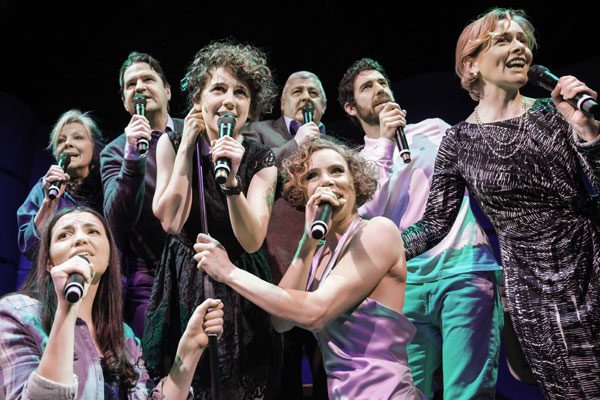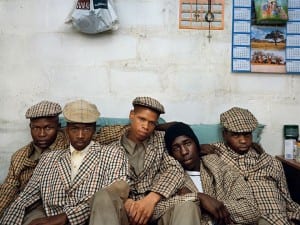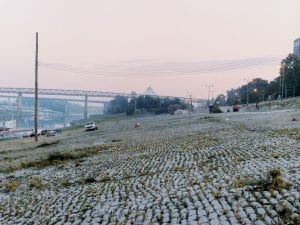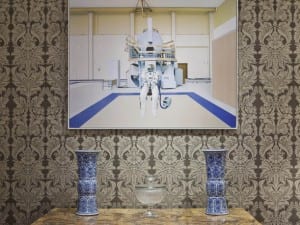In the Republic of Happiness is Martin Crimp’s newest play currently performed at the Royal Court Theatre until 19 January. A violent satire, In the Republic of Happiness begins with the unexpected arrival of Uncle Bob who delivers a long and outrageous message. Disrupting a family Christmas, Uncle Bob’s visit throws up many questions and one certainty: the world will never be the same again. Previously working on The City, Attempts On Her Life, The Country, Face to the Wall (to name a few) at Royal Court Theatre, Crimp talks to Aesthetica about his writing and inspiration.
A: You’ve done a lot of great work with the Royal Court over the years; what is it specifically that attracts you to the theatre?
MC: Everyone will have their own mental picture of what the Royal Court is. For me it’s the place where I feel free to experiment – and where the experiment is welcome. In the Republic of Happiness , for example, is not really like anything I’ve written before. Plus this theatre still has a tradition of challenging the status quo – politically and aesthetically.
A: Can you tell us where the main inspiration came from for this new play?
MC: I became fascinated by the vast number of contemporary voices making demands – demands for compensation – demands for the latest drug – demands for the recognition and honouring of trauma and suffering. And beneath this tumult of demands – many of which, of course, are legitimate – there’s a kind of sadness. What is it about our society that makes us feel angry and vulnerable even when we are materially prosperous? Is it the lie of self-authorship? – because the US / UK model of laissez-faire liberalism insists that individuals are entirely responsible for their own destiny – while at the same time fabricating needs which – notoriously – can never be met. These voices were the starting point for this play.
A: More generally, how does the creative process usually unfold for you? Does it vary depending on the play in question or does it always follow a similar trajectory?
MC: When a specific voice produces a specific image, then a play can begin. I believe this only happens when you put pen to paper, since only then does writing become concrete – marks on a page. Most of what I write never goes into a play.
A: The Royal Court’s Artistic Director, Dominic Cooke, is directing. Can you say a little about his vision for the project and how it serves to complement yours?
MC: The play is divided into three distinct parts – in fact three different kinds of theatre – and Dominic, together with designer Miriam Buether, are highlighting this structure with three strikingly different environments, and, you might almost say, three different approaches to acting.
A: There’s a real tension between the central characters in the piece. Is this something of a trend in your work, and can you identify any other common themes running across your plays?
MC: If there’s no tension, there’s no drama. As for themes, I don’t think it’s wise for a writer to talk too much about this. Writing is hopefully driven by something deeper than a desire to tick boxes.
A: You’re about to go into rehearsals for the production. Can you talk us through your involvement in the rehearsal process at each stage?
MC: I like to be there at the beginning, and then – as a useful outside eye – appear again at the end.
A: Can you tell us more about the cast you are working with and their contribution to the project?
MC: I have a brilliant cast of eight – and it’s a particular pleasure to work on this play with a group who span a number of generations, each bringing their own unique perspective to the project.
A: What is next for both you and the play after this Royal Court premiere?
MC: One of the most fulfilling artistic collaborations I have is with the composer George Benjamin. I’ve written the text for his two operas – and the most recent of these, Written Skin, comes to Covent Garden in March of next year.
In the Republic of Happiness, until 19 January, Royal Court Theatre , Sloane Square, London, SW1W 8AS
Credits
All images courtesy of Johan Persson
1. Seline Hizli, Anna Calder-Marshall, Stuart McQuarrie, Ellie Kendrick, Peter Wight, Michelle Terry, Paul Ready, Emma Fielding.
2. Emma Fielding, Seline Hizli, Peter Wight, Stuart McQuarrie Anna Calder-Marshall, Ellie Kendrick, Paul Ready.
3. Michelle Terry, Stuart McQuarrie
4. Stuart McQuarrie, Paul Ready, Anna Calder-Marshall, Emma Fielding, Seline Hizli
5. Michelle Terry





